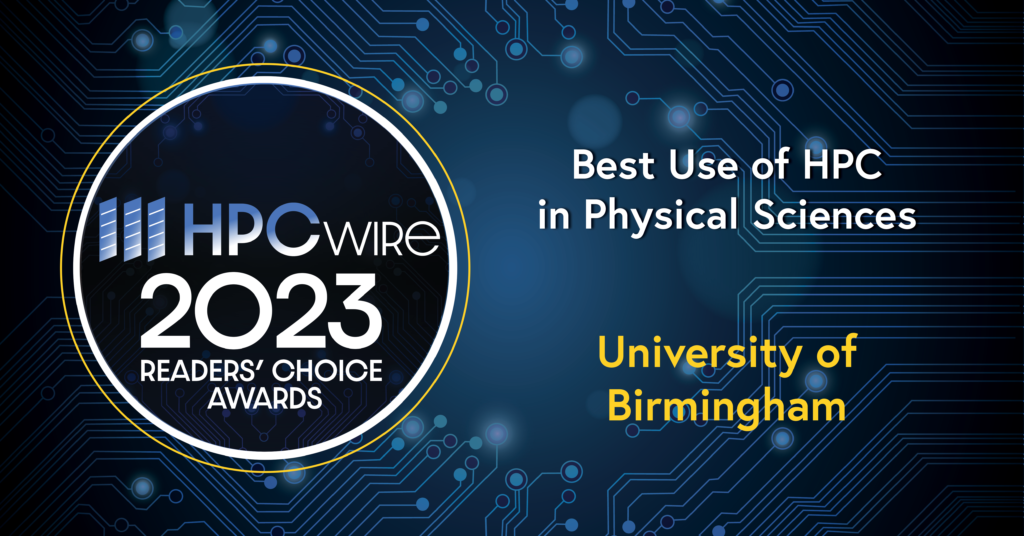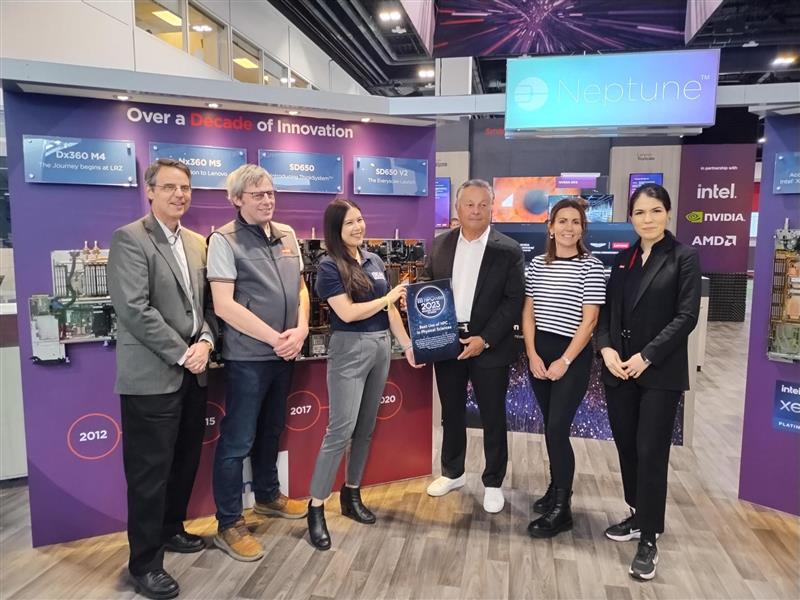We are excited to announce that researchers who use our advanced computing facilities have been recognised as award winners in the HPCwire 2023 awards! Advanced Research Computing is very proud to provide the BEAR computing facilities to support life changing research at the University, which has again been internationally recognised in these highly competitive, global awards. For more details on the awards and the research involved have a read of the press release below…
Denver, CO — November 13, 2023 — The University of Birmingham has been recognized in the 20th Anniversary edition of the HPCwire Readers’ Choice Awards, presented at the 2023 International Conference for High Performance Computing, Networking, Storage, and Analysis (SC23), in Denver, Colorado. The list of winners was revealed at the SC23 HPCwire booth, as well as on the HPCwire website: www.hpcwire.com/2023-hpcwire-awards-readers-editors-choice.
The University of Birmingham was recognized with the following honors:

University of Birmingham researchers used its BlueBEAR supercomputer (Lenovo, with Intel CPUs and IBM Spectrum Scale Storage, supplied by OCF Limited) to analyze manufacturing process data from a novel inline sensor and developed a model that predicts critical quality attributes of the end product, with the aim of reducing waste and improving the sustainability of the pharmaceutical manufacturing processes.
Dr Kit Windows-Yule (School of Chemical Engineering) led this work at the University of Birmingham, with Issa Munnu performing the experimental work and analysis thereof, and Leonard Nicuşan developing the machine learning tools used for the model.

Using decades of pulsar observations to turn the Milky Way into a galaxy-sized gravitational-wave detector, University of Birmingham researchers conducted numerous simulations using its BlueBEAR (Lenovo, with Intel CPUs and IBM Spectrum Scale Storage, supplied by OCF Limited) cluster to find strong evidence for the existence of very low-frequency gravitational waves permeating the universe.
Within a large international team, the work at the University of Birmingham was led by Dr Paul Brook (Institute for Gravitational Wave Astronomy and School of Physics and Astronomy). Paul describes the award-winning research in more detail below:
As part of a global collaboration of astronomers, we have used decades of pulsar observations to turn the Milky Way into a galaxy-sized gravitational wave detector. In June 2023, we published strong evidence for low-frequency disturbances in the fabric of space-time which pervade the entire universe. Possible sources of this “gravitational wave background” include binary systems of supermassive black holes within galaxies or even events occurring shortly after the inception of the universe during the Big Bang. As part of the effort, University of Birmingham researchers (Institute for Gravitational Wave Astronomy and School of Physics and Astronomy), led by myself, used the BlueBEAR cluster to search for the gravitational wave background and explore the various physical mechanisms that could be attributed to the observed signal. Detecting the gravitational wave background opens a new window in the gravitational wave spectrum and helps scientists to enhance their understanding of the evolution of galaxies, their central black holes, and of the early universe.
Dr Paul Brook
The coveted annual HPCwire Readers’ Choice Awards are determined through a nomination and voting process with the global HPCwire community, as well as selections from the HPCwire editors. The awards are an annual feature of the publication and constitute prestigious recognition from the HPC community. They are revealed each year to kick off the annual supercomputing conference, which showcases high performance computing, networking, storage, and data analysis.
“This year we are celebrating the 20th anniversary of these renowned awards, and the 2023 Readers’ and Editors’ Choice Awards are exceptional, indeed,” said Tom Tabor, CEO of Tabor Communications, publishers of HPCwire. “Throughout the world there are pockets of brilliant scientists working on grand challenge problems that can only be explored and solved because of HPC. Rarely do these accomplishments come to light, much less are they recognized for their achievements and contribution to society. Between our worldwide readership of HPC experts and the most renowned panel of editors in the industry, the Readers’ and Editors’ Choice Awards represent resounding recognition of the many deep and varied HPC accomplishments throughout the world. Our sincerest gratitude and hearty congratulations go out to all of the winners.”
More information on these awards can be found at the HPCwire website (www.HPCwire.com) or on Twitter through the following hashtag: #HPCwireRCA23.

About HPCwire
HPCwire is the #1 news and information resource covering the fastest computers in the world and the people who run them. With a legacy dating back to 1986, HPCwire has enjoyed a legacy of world-class editorial and journalism, making it the news source of choice selected by science, technology, and business professionals interested in high performance and data-intensive computing. Visit HPCwire at www.hpcwire.com.
